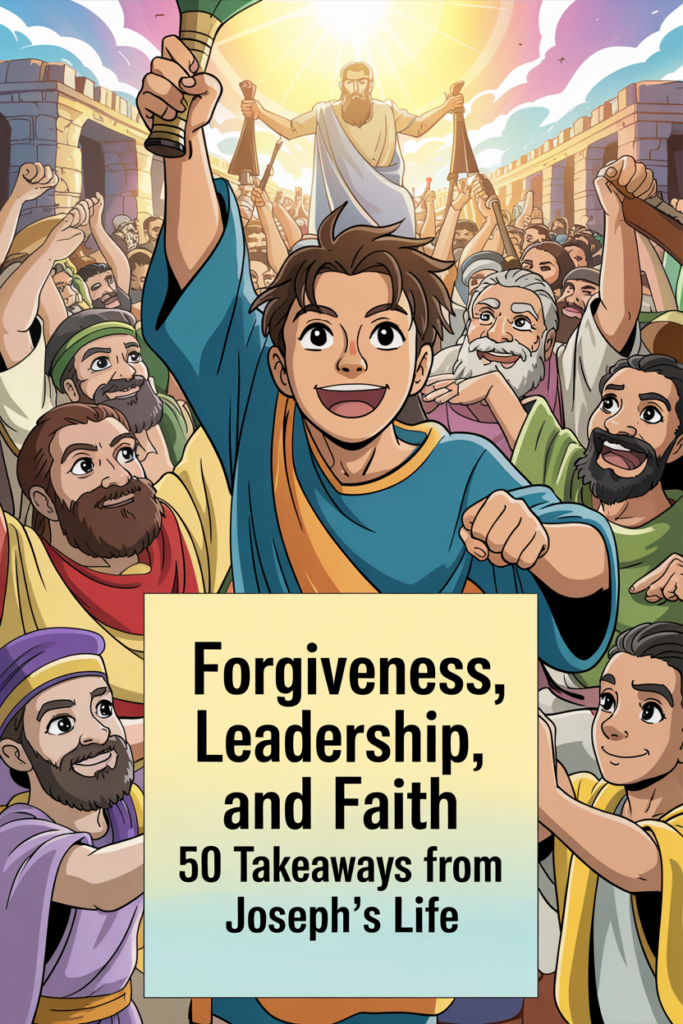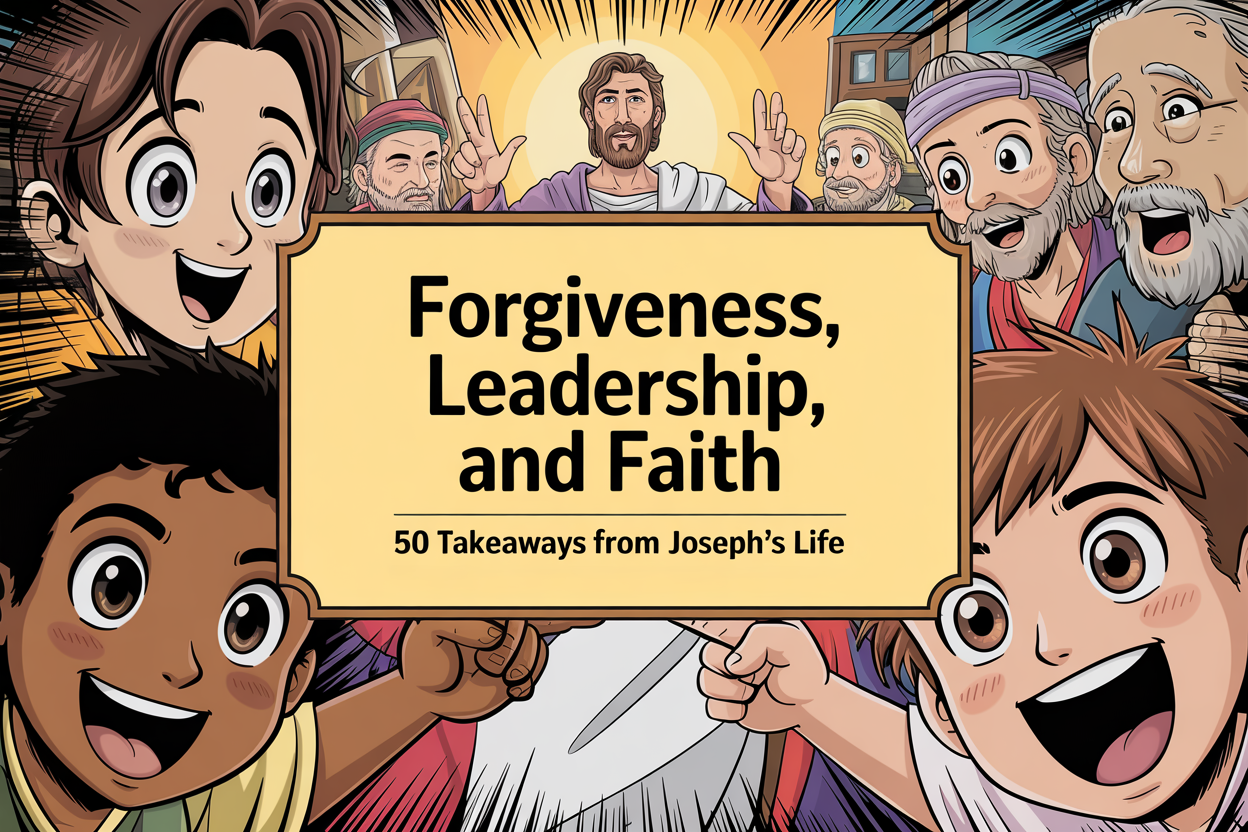I’ll admit some days feel like I’m stuck in a pit of my own making, wondering where God is in the delay. Joseph faced betrayal, imprisonment, desertion, and fear yet kept faith in every twist and turn.
Here are fifty encouraging insights drawn from his dreams, his obedience to angelic warnings, his steadfast forgiveness of family, and his godly leadership, all backed by KJV verse references to point you to the One who carried Joseph through every season.

Dream Visions
- Joseph dreamed of binding sheaves and his sheaf stood upright while his brothers’ sheaves bowed to it (Genesis 37:7).
- Joseph dreamed that the sun, moon, and eleven stars would bow to him, foreshadowing his family’s honor (Genesis 37:9).
- Joseph attributed the interpretation of dreams to God, recognizing that divine wisdom alone reveals their meaning (Genesis 40:8).
- Joseph interpreted Pharaoh’s dream of healthy and gaunt cows, foretelling seven years of plenty followed by seven years of famine (Genesis 41:25–26).
- Joseph interpreted Pharaoh’s vision of full and withered ears of corn, confirming God’s message of abundance and scarcity (Genesis 41:29–30).
- Joseph declared the meaning of Pharaoh’s dreams came from the Lord and not from himself (Genesis 41:16).
- Joseph waited faithfully for twenty-two years before his early dreams were fulfilled (Psalm 105:19).
- Joseph’s dreams gave him steadfast hope and guided his actions even in prison (Acts 7:9–10).
Divine Messengers
- The angel of the Lord appeared to Joseph of Nazareth in a dream, assuring him to take Mary as his wife (Matthew 1:20).
- The heavenly messenger revealed that Mary’s child was conceived by the Holy Ghost and would save people from their sins (Matthew 1:21).
- An angel warned Joseph to flee to Egypt with Mary and the infant Jesus to protect him from Herod’s decree (Matthew 2:13).
- Joseph obeyed the angel’s command immediately, escaping to Egypt that same night (Matthew 2:14).
- After Herod’s death, an angel appeared to Joseph in Egypt, instructing him to return to Israel (Matthew 2:19–20).
- Joseph heeded the angel’s warning to avoid Judea and settled in Nazareth, fulfilling prophecy (Matthew 2:22).
Family Bonds and Forgiveness
- Joseph’s heart overflowed with compassion when he saw his brother Benjamin, and he wept aloud (Genesis 43:30).
- Joseph gave Benjamin five times more food than his other brothers as a sign of his special love (Genesis 43:33–34).
- Joseph tested his brothers by framing Benjamin with a silver cup to reveal their hearts (Genesis 44:2–4).
- Judah offered himself as a substitute for Benjamin, demonstrating genuine repentance (Genesis 44:33–34).
- Joseph revealed himself to his brothers and explained that God had sent him to preserve life (Genesis 45:7–8).
- Joseph comforted his brothers and reassured them of his forgiveness after Jacob’s death (Genesis 50:21).
Leadership and Character
- The Lord prospered Joseph in Potiphar’s house, making him overseer of all his master’s household (Genesis 39:2–4).
- Joseph refused temptation from Potiphar’s wife, choosing righteousness over sin (Genesis 39:9).
- Joseph fled Potiphar’s wife’s advances rather than sin against God, demonstrating moral integrity (Genesis 39:12).
- The Lord granted Joseph favor in prison, and the jailer put him in charge of all the prisoners (Genesis 39:21–23).
- Joseph interpreted Pharaoh’s dreams with wisdom, offering practical counsel that saved Egypt (Genesis 41:39–40).
- Pharaoh recognized the Spirit of God in Joseph and appointed him as ruler over Egypt (Genesis 41:38–41).
- Joseph stored grain during the years of plenty, demonstrating strategic foresight and leadership (Genesis 41:48–49).
Identity and Roles
- Joseph son of Jacob was the eleventh son of Israel and firstborn of Rachel, marking his special place in God’s plan (Genesis 35:24).
- God was with Joseph wherever he went, confirming his identity as God’s chosen steward (Genesis 39:2–3).
- Joseph of Nazareth was called a just man, reflecting his steadfast righteousness (Matthew 1:19).
- Joseph of Nazareth was of the lineage of David, fulfilling prophecy regarding the Messiah’s descent (Matthew 1:20).
- Joseph of Nazareth provided for Mary and Jesus as a carpenter, faithfully fulfilling his protective role (Matthew 13:55).
Symbolism and Prophetic Typology
- Joseph was betrayed by his brothers for silver, foreshadowing the Messiah’s betrayal for thirty pieces of silver (Genesis 37:28 / Matthew 26:15).
- Joseph suffered innocently under false accusation, mirroring Christ’s unjust suffering (Genesis 39:20 / 1 Peter 2:22).
- Joseph was exalted to save lives during famine, prefiguring Christ’s exaltation to bring salvation (Psalm 105:21 / Philippians 2:9–10).
- Joseph forgave his brothers and provided for them, reflecting Christ’s forgiveness and provision for sinners (Genesis 50:19–20 / Luke 23:34).
- Joseph’s garment was stripped from him, paralleling Christ’s robes being divided by soldiers (Genesis 37:23 / John 19:23).
- Joseph carried his father’s bones from Egypt, pointing to resurrection and fulfillment of God’s promises (Genesis 50:25 / Acts 13:32–33).
- Joseph’s administration saved nations from hunger, foreshadowing Christ who feeds us with the bread of life (Genesis 41:38–41 / John 6:35).
- Joseph preserved his family’s lineage, typifying Christ who preserves believers as His children (Genesis 45:7 / John 10:28).
Lessons, Benefits, and Applications
- Waiting on God in trials refines our character, as seen in Joseph’s patience during twenty-two years of delay (Psalm 105:19).
- Honoring God above all leads to blessing, exemplified by Joseph’s refusal to sin with Potiphar’s wife (Genesis 39:9).
- Forgiving those who wrong us releases us from bitterness, as Joseph forgave his brothers wholeheartedly (Genesis 50:21).
- Immediate obedience to God’s guidance brings protection, as when Joseph fled to Egypt by night (Matthew 2:14).
- Wise stewardship honors God and benefits many, demonstrated by Joseph’s grain storage for famine (Genesis 41:48).
- Trusting God’s sovereignty transforms suffering into purpose, as Joseph declared God meant evil for good (Genesis 50:20).
Historical and Chronological Context
- At seventeen years old, Joseph was sold into slavery by his brothers and taken to Egypt (Genesis 37:2).
- At thirty years old, Joseph was appointed governor of Egypt after interpreting Pharaoh’s dreams (Genesis 41:46).
- In the second year of famine, Joseph’s brothers bowed before him, fulfilling his youthful dreams (Acts 7:11–13).
- Joseph died at the age of 110 after faithfully serving God and preserving Israel’s lineage (Genesis 50:26).
Affiliate Disclosure: "As an Amazon Associate I earn from qualifying purchases made from links in this post. We are a participant in the Amazon Services LLC Associates Program, an affiliate advertising program designed to provide a means for us to earn fees by linking to Amazon.com."

